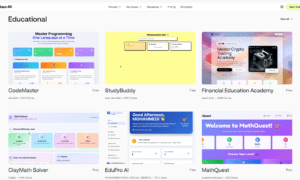Nowadays, video games have become a huge industry, and with the rise of mobile gaming. The video game market is forecasted to hit the number of U.S. $282.30 billion in revenue by 2024.
Have you ever thought about creating your own game? We bet you have at least once when you figure out a good game on your smartphone. It may seem like a daunting task, but it can actually be a fun and rewarding experience. What if we tell you that creating an Android game is not as stressful as you might think? In this guide, we’ll share some tips and tricks for creating an Android game with less stress. Let’s get started!
Know the Basics of an Android Game
Android games refer to video games that are specifically designed and developed to run on devices using the Android operating system. These devices include smartphones, tablets, smart TVs, and even some wearable gadgets. Given the widespread adoption of Android as a mobile operating system, Android games have become incredibly popular and cater to a diverse audience with varying preferences.
Features of a Simple Android Game
Accessibility and Portability
- Android games can be played on the go thanks to the portable nature of smartphones and tablets.
- Many games are available for free or for a small fee on the Google Play Store.
Variety of Genres
- Android games span across multiple genres, including action, adventure, puzzle, strategy, simulation, sports, and more.
- There is always something for everyone, from casual gamers to hardcore enthusiasts.
Touchscreen Controls
- Most Android games leverage touchscreen controls for interaction to provide an intuitive and interactive gaming experience.
- Some games also support external controllers and gamepads for enhanced gameplay.
Frequent Updates and Improvements
- Developers regularly update Android games to fix bugs, add new features, and improve user experience.
- Continuous updates help in maintaining player engagement and prolonging the game’s lifecycle.
In-app purchases and Monetization
- Many Android games incorporate in-app purchases, allowing players to buy virtual goods or premium content.
- Advertisements are also a common monetization strategy in free-to-play games.
Decide Which Type of Games to Make
There are various types of games that you can create for Android, each with its own unique challenges and appeal. Some popular types of Android games include:
Casual Games
Easy to learn and play, these games are designed for quick, short sessions.
Examples: Candy Crush Saga, Angry Birds.
Role-playing Games (RPGs)
In RPG games, the player assumes the roles of main characters in a fictional setting, often involving story-driven quests.
Examples: Genshin Impact, Final Fantasy XV: A New Empire.
Puzzle Games
Focus on solving puzzles or completing challenges, often requiring logical thinking and strategy.
Examples: Monument Valley, Cut the Rope.
Strategy Games
Emphasize planning and skillful resource management to achieve victory.
Examples: Clash of Clans, Plague Inc.
Action and Adventure Games
Combine fast-paced action with exploration and storytelling.
Examples: PUBG Mobile, Minecraft.
Simulation Games
Mimic real-world activities allow players to create and manage virtual environments.
Examples: The Sims Mobile, SimCity BuildIt.
Choose the Right Game Engine
Selecting the right game engine is one of the critical steps in creating an Android game. A game engine is a robust software framework that equips developers with essential tools and functionalities to bring their game ideas to life. Given the multitude of options available, making this choice can seem daunting.
To simplify your decision, consider key factors such as your experience level, budget, and the type of game you aim to develop. Popular game engines for Android development include Unity, GameMaker Studio, and Unreal Engine, each offering unique functions to cater to various needs and preferences.
Start Small
Launching a new project often ignites grand ideas and ambitious plans. However, to reduce stress while developing an Android game, it’s wise to start with simplicity. Focus on building a game with basic mechanics and features.
Starting small not only makes the development process more manageable but also allows you to gradually hone your skills. This incremental approach helps you establish a solid foundation before incorporating more complex elements into your game.
Take Advantage of Available Resources
Is it possible to create an Android game without coding? Not really. However, you don’t have to do everything from scratch. There are abundant resources available that can streamline the process and enhance your efficiency. Here’s how you can make the most of them:
Tutorials and Guides
The internet is teeming with comprehensive tutorials and guides that can walk you through the game development process step-by-step. From beginner-friendly courses to advanced programming techniques, these resources can significantly shorten your learning curve and provide practical insights.
Community Support
Joining online communities or forums dedicated to game development can be immensely beneficial. These online platforms enable you to connect with experienced programmers/developers who can offer valuable insights, tips, and support. Whether you’re troubleshooting a bug or seeking feedback on your game design, community support can be a lifeline.
Assets and Templates
Utilizing pre-made assets and templates can save you considerable time and effort. Many websites offer free or purchasable graphics, sound effects, music, and even code snippets. These resources enable you to focus more on the core mechanics and unique elements of your game rather than starting from scratch.
AI and Game Engines
Leveraging artificial intelligence (AI) and robust game engines like Unity, Unreal Engine, or Godot can greatly simplify the development process. These tools handle complex tasks such as physics simulations, animations, and even procedural content generation, allowing you to focus on creativity and gameplay design.
Documentation and SDKs
Make use of the official documentation and software development kits (SDKs) provided by platforms like Android Studio. These resources are invaluable for understanding best practices, accessing APIs, and ensuring your game runs smoothly on various devices.
Online Courses and Workshops
Investing in online courses or attending workshops can provide structured learning and keep you updated with the latest trends and state-of-the-art technologies in game development. Platforms like Coursera, Udemy, and LinkedIn Learning are where you can find a range of courses tailored to different skill levels.
Read More From Techbullion And Businesnewswire.com




































